COVID-19 has morphed from a dangerous regional health threat to an all-consuming global pandemic and economic disaster. COVID-19’s rapid spread has had far-reaching implications on the everyday lives of people in nearly all corners of the world, and underlines the need for governments at all levels to coordinate cross-cutting and cross-boundary response and recovery programmes.
Global sustainability is at the core of the IGES mission. The institute is thus dedicated to working across international boundaries and across issues to support the response to current needs and recovery towards our future. In addition, in dealing with such pandemics and their wide-ranging impacts, IGES has developed the Triple R Framework. The framework is composed of three building blocks: emergency “response” to address direct impacts, “recovery” from the crisis, and the “redesign” of socioeconomic systems to achieve a sustainable and resilient world. These building blocks often have different timeframes or scopes. However, even as the world seeks to respond and recover as quickly as possible, the essential question is to what extent these can be pursued steadily and effectively while considering the “redesign” of our societies in the future.
In this session, we will invite representatives from our partner organisations, and ask each of them to introduce what efforts their organisations have taken in response to COVID-19. Then, we will discuss how synergies are being created between their COVID-19 efforts and their efforts to address priority issues such as climate change, SDGs and biodiversity, finally, we will explore what is necessary for us to redesign our society.
President, IGES
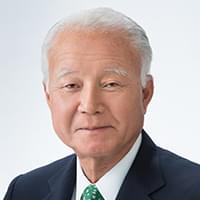
Kazuhiko Takeuchi
President, IGES
Kazuhiko TAKEUCHI graduated from the Department of Geography, the University of Tokyo in 1974. He obtained M.Agr. and Ph.D. from the Graduate School of Agriculture, the University of Tokyo. He served as a Professor at the Asian Natural Environmental Science Center, and as Professor at the Graduate School of Agricultural and Life Science at the University of Tokyo from 1997 to 2012. He also served as a Vice-Rector and Senior Vice-Rector at the United Nations University from 2008 to 2016.
From 2016, he has served as a Senior Visiting Professor at United Nations University Institute for the Advanced Study of Sustainability (UNU-IAS). He was Director and Professor/Project Professor of IR3S at the University of Tokyo from 2017 to 2019. He has served as President, Institute for Global Environmental Strategies (IGES) since July 2017. He took up the position as Project Professor of the Institute for Future Initiatives (IFI) at the University of Tokyo in April 2019. He has served, inter alia, as Chair of the Central Environmental Council, Government of Japan, Editor-in-Chief of the journal Sustainability Science (Springer Nature) and Distinguished Chair, Wangari Maathai Institute for Peace and Environmental Studies, University of Nairobi.
He specialises in landscape ecology, landscape planning, and sustainability science.
Under-Secretary-General of the United Nations and Executive Secretary of ESCAP
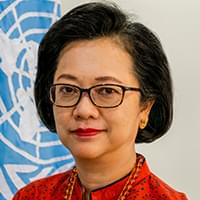
Armida Salsiah Alsjahbana
Under-Secretary-General of the United Nations and Executive Secretary of ESCAP
Ms. Armida Salsiah Alisjahbana, Executive Secretary of the United Nations Economic and Social Commission for Asia and the Pacific took office on 1 November 2018. Ms. Alisjahbana was Professor of Economics at Universitas Padjadjaran and was Minister of National Development Planning and the Head of the National Development Planning Agency (BAPPENAS), Indonesia from 2009 to 2014. In 2016, Ms. Alisjahbana was a member of the High-Level Independent Team of Advisors to support the ECOSOC Dialogue on the longer-term positioning of the United Nations for the 2030 Agenda. Ms. Alisjahbana obtained her Ph.D. in Economics from the University of Washington, USA.
Link to the webpage of the Executive Secretary of ESCAP
Executive Secretary of the Convention on Biological Diversity
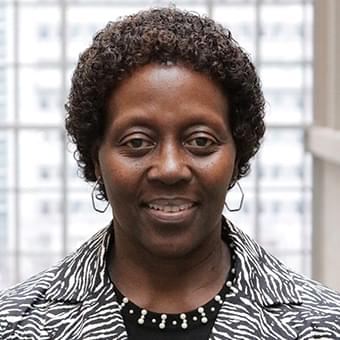
Elizabeth Maruma Mrema
Executive Secretary of the Convention on Biological Diversity
She has worked with the UN Environment Programme for over two decades and was the Director of the Law Division at UNEP. Prior to joining the Law Division, she was Deputy Director of the Ecosystems Division, in charge of coordination, operations and programme delivery. Prior to these duties, she also served as Executive Secretary of the UNEP/Secretariat of the Convention on the Conservation of Migratory Species of Wild Animals. Her work at UNEP has focused on development, implementation and enforcement of environmental laws, including multilateral environmental agreements at national, regional and international levels.
Vice-President for Knowledge Management and Sustainable Development, Asian Development Bank (ADB)
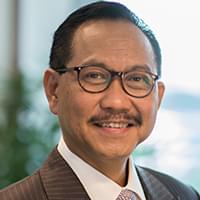
Bambang Susantono
Vice-President for Knowledge Management and Sustainable Development, Asian Development Bank (ADB)
Dr. Bambang Susantono is the Vice-President for Knowledge Management and Sustainable Development of the Asian Development Bank. He coordinates research and studies on wide-ranging topics from energy and transport to health and finance, in addition to climate change, education, environment, governance, gender equality, rural development and food security, and regional cooperation.
He served as Acting Minister of Transportation of Indonesia, and as Deputy Minister for Infrastructure and Regional Development and the Office of Coordinating Ministry for Economic Affairs.
He holds a Ph.D. in infrastructure planning, as well as master’s degrees in transportation engineering and city and regional planning from UC Berkeley and a bachelor’s in engineering from the Bandung Institute of Technology.
President and CEO, International Institute for Sustainable Development (IISD)
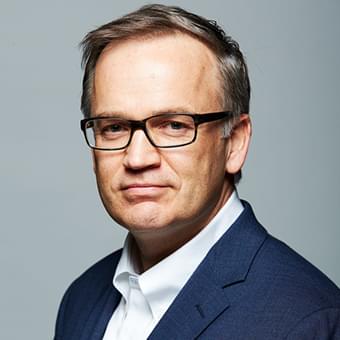
Richard Florizone
President and CEO, International Institute for Sustainable Development (IISD)
Dr. Richard Florizone is President and CEO of IISD, and President Emeritus of Dalhousie University. Originally from Prince Albert, Saskatchewan, Richard has also held senior roles with the Boston Consulting Group, Cambridge University, Bombardier Aerospace, and the International Finance Corporation. Part scientist, part strategist, Richard has a strong track record of forging collaborative partnerships to build institutions and communities that are intelligent, inclusive and inspiring. He holds a Ph.D. in Physics from MIT and is a Fellow of the Canadian Academy of Engineering.